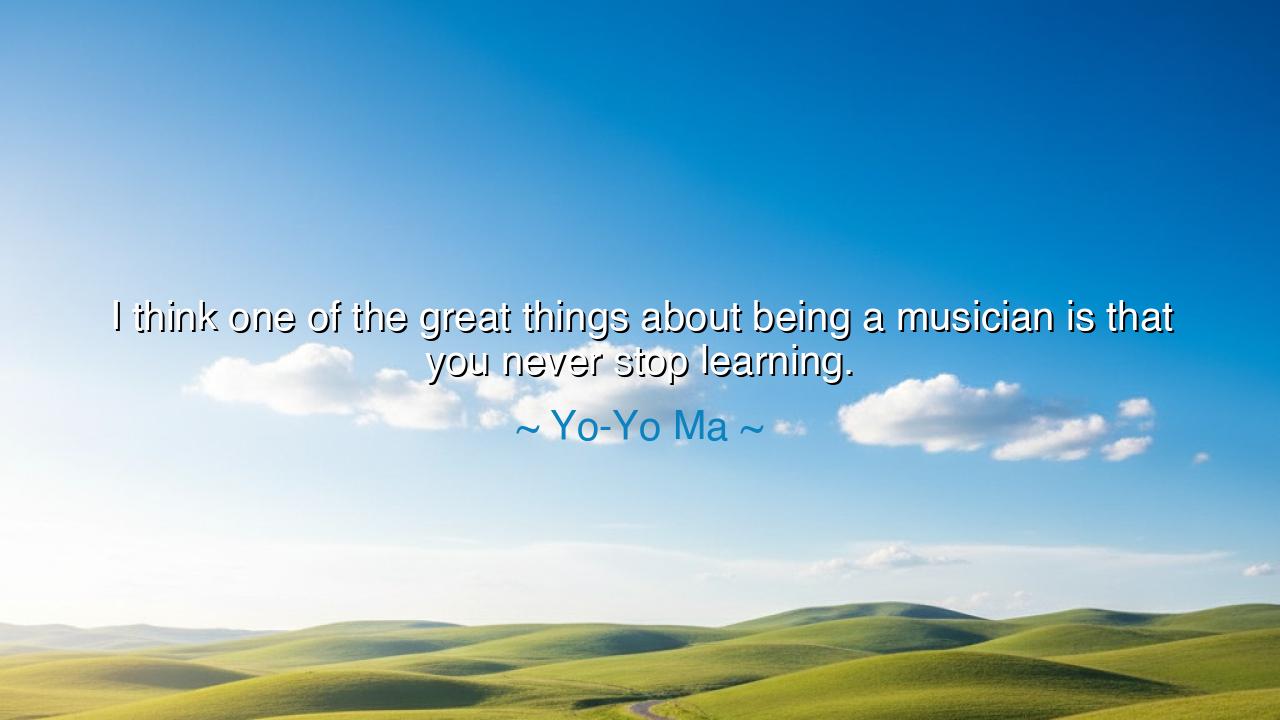
I think one of the great things about being a musician is that
I think one of the great things about being a musician is that you never stop learning.






“I think one of the great things about being a musician is that you never stop learning.” – Yo-Yo Ma
In these words, Yo-Yo Ma, the master cellist and humble philosopher of sound, speaks of a truth that extends far beyond music itself — a truth that touches the essence of life and growth. For in the heart of every musician lies a sacred paradox: the more one learns, the more one realizes how much remains to be discovered. Ma, who has played before kings and crowds, who has explored every corner of melody and tradition, reminds us that even mastery is but another beginning. The soul that creates is the soul that learns, forever open, forever seeking, forever renewed.
The origin of this quote reflects Yo-Yo Ma’s lifelong journey — a journey not of conquest, but of communion. Born in Paris to Chinese parents and raised in New York, he was a prodigy who stood before presidents as a child, performing with the grace of one twice his age. Yet, unlike many who rest upon early genius, he never ceased to be a student. He studied not only the notes but the silence between them; not only Western classical music, but the folk songs of Appalachia, the rhythms of Africa, the ancient modes of Asia. To him, being a musician is not a finished state — it is an eternal apprenticeship to beauty, to humanity, and to truth.
In saying “you never stop learning,” Ma captures the spirit that animates all artists, scholars, and seekers of wisdom. Learning, he suggests, is not a ladder to climb, but a river to enter — one that carries us ever forward, reshaping our understanding with each new current. The musician’s task is to listen: not only to sound, but to the world, to others, to the stirrings of the heart. Each note teaches patience; each mistake teaches humility. The moment one believes they have learned all, the music dies within them. Thus, to be alive — truly alive — is to be learning always.
The ancients knew this well. In Greece, the philosopher Pythagoras taught that music was the architecture of the universe, that the movements of the stars themselves followed the laws of harmony. Yet he called himself not a master, but a “lover of wisdom.” He listened to the cosmos as one might listen to an instrument, ever attuned to the mystery of its song. Likewise, Yo-Yo Ma stands in this lineage of the musical philosopher, one who finds in melody not pride but reverence. For each note is a prayer, each chord a reminder that perfection is not a destination, but a journey of attention and awe.
Consider the story of Ludwig van Beethoven, whose deafness might have silenced a lesser man. Stripped of hearing, he continued to compose, not from memory alone, but from the vast landscape of understanding he had cultivated through years of listening, learning, and feeling. His late symphonies — written in silence — were not the creations of a man who had finished learning, but of one who had learned to listen in new ways. His suffering became his teacher; his limitations became instruments of revelation. In him, as in Ma’s words, we see that the learner’s path never ends, even when the world grows silent around them.
Yo-Yo Ma’s quote also carries a lesson of humility. For true mastery is never boastful — it bows before the infinite. A musician, no matter how skilled, knows that each performance is fleeting, each interpretation incomplete. The cello may resonate perfectly today, and falter tomorrow; the same piece played twice will never sound the same. This is the beauty of art, and of life itself: both are impermanent, both demand presence, both require that we listen deeply and adapt. To never stop learning is to never stop becoming.
So let this be the teaching: whatever your craft — whether music, science, or living itself — remain a student. Approach your work with wonder, your failures with curiosity, and your successes with gratitude. Seek teachers in all things — in the whisper of the wind, in the laughter of a child, in the silence that follows a song. Let learning be your companion until the end, and let curiosity keep your spirit forever young.
For as Yo-Yo Ma reminds us, the greatest gift of creation is not applause or mastery, but the endless unfolding of understanding. To never stop learning is to remain forever alive to beauty, forever open to transformation. And when you finally lay down your instrument — whether it is the cello, the pen, or the beating heart itself — let it be said that you, too, were a musician of life, who never ceased to learn the music of the world.






AAdministratorAdministrator
Welcome, honored guests. Please leave a comment, we will respond soon